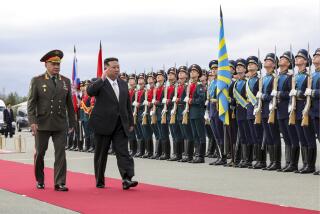Gorbachev Leaves Tokyo, and Kaifu Says He Wants to Visit Moscow in Near Future : Diplomacy: Japanâs premier feels he won an âextremely significantâ point in dispute over four islands. The Soviet leader flies to South Korea.
TOKYO â Japanese officials suggested Friday that Soviet President Mikhail S. Gorbachevâs visit here had opened the door to some economic aid from Japan, and Prime Minister Toshiki Kaifu declared that he wants to visit the Soviet Union as soon as possible.
Diplomats said the trip might be made in August or September after an advance visit to Moscow by Foreign Minister Taro Nakayama following the London economic summit of seven advanced industrialized democracies July 15-17.
Gorbachev wound up his four-day visit with a whirlwind tour of Kyoto, Osaka and Nagasaki.
âI would like to emphasize . . . once more my adherence to the idea of a nuclear-free world, step by step, together with the other nuclear powers,â Gorbachev said after laying a wreath in Nagasakiâs Peace Memorial Park, where the worldâs second nuclear bomb attack occurred.
More than 70,000 people died when an American B-29 dropped the bomb on Aug. 9, 1945, which also was the day on which the Soviet Union broke a nonaggression treaty and declared war on Japan. Six days later, the Japanese surrendered, ending World War II.
Gorbachev, who became the first head of state ever to visit the Nagasaki bomb site, later flew on to Cheju Island in South Korea to meet with South Korean President Roh Tae Woo.
Kaifu described as âextremely significantâ an agreement he won from Gorbachev to specify, by name, the four islands the Soviets seized at the end of World War II and recognize that the dispute over their ownership must be resolved in order to conclude a peace treaty. Previously, no Soviet leader had been willing to go beyond a vague reference to âall problemsâ when referring to peace treaty negotiations.
The new agreement, Japanese diplomats said, produced âa change of moodâ in Japan.
âWe reached a starting point from which to aim at our goal. A process of confidence-building is about to begin,â one diplomat said.
With Gorbachev refusing to acknowledge Japanâs sovereignty over the islands and Kaifu, in turn, withholding any promise of economic aid, both Gorbachev and Japanese officials acknowledged that the results fell short of a âbreakthroughâ in Japanese-Soviet relations.
But Foreign Minister Nakayama said that ânew argumentsâ in favor of economic assistance âwill emerge as a result of these meetings.â
Another Foreign Ministry official, speaking not for attribution, said that Gorbachevâs visit at least had opened the door âfor economic relations to expand.â He mentioned private deals âin which the (Japanese) government is involvedâ as a possibility.
This official emphasized, however, that full-fledged aid would not be given until âan outlook for a peace treaty to be signed comes into view.â
âFor large-scale economic assistance to take place, we need to establish a stable political basis for our relations with the Soviet Union. And for a stable basis, we need to conclude a peace treaty,â the diplomat said.
Vice Finance Minister Masami Kogayu told Japanese reporters that Tokyo will proceed with economic assistance to Moscow in line with progress in the territorial dispute.
Japan rejected Gorbachevâs appeals for Soviet, Japanese and American naval disarmament in the Pacific and plans to ignore the Soviet leaderâs proposal for a five-nation summit meeting to discuss Asian security, the diplomats said.
âI donât think the United States has anything to worry aboutâ as a result of the Gorbachev visit, one of the diplomats said. But he added that Japan will agree to discuss âsubregionalâ Asian security issues with the Soviets.
After negotiations that kept Gorbachev up until after 2 a.m. Friday, the Soviet leader decided to have an unscheduled overnight stay on South Koreaâs Cheju Island and to meet with Roh this morning. Originally, he had planned to fly home Friday night.
More to Read
Sign up for Essential California
The most important California stories and recommendations in your inbox every morning.
You may occasionally receive promotional content from the Los Angeles Times.










